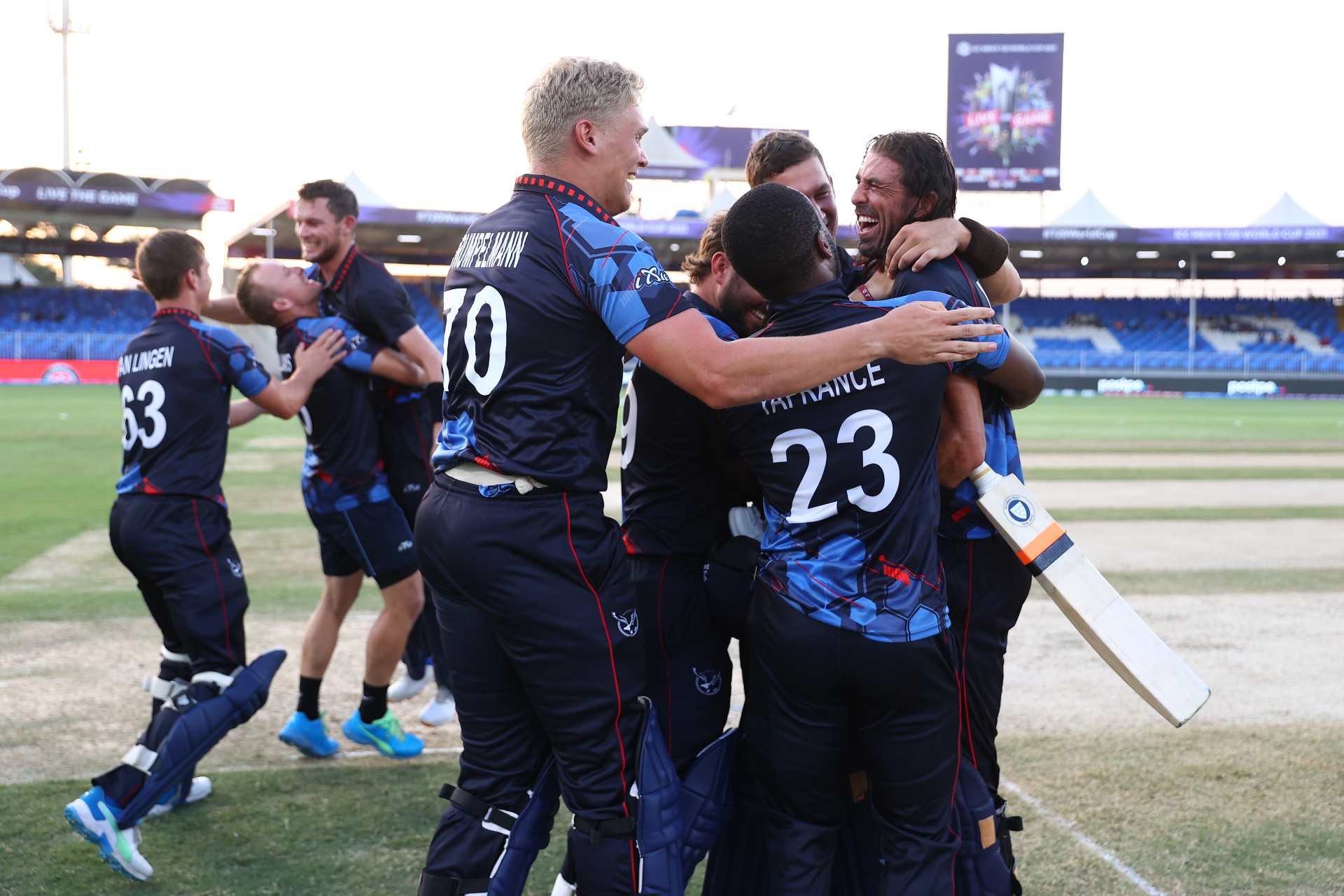 OPINION
OPINIONTime and again in this edition of the T20 World Cup, Namibia have shown nerves of steel, they have shown that even though it is all stacked against you, if you trust yourself enough, you can get past that challenge.
After being crushed in their qualification opener against Sri Lanka, none gave them any chance in a group that had Ireland and Netherlands but that’s where they showed skills. First skills, next nerves and then there was the wild celebration. Following their wins over both Ireland and Netherlands, there was David Wiese, who walked back, punching the air.

No one expected them to clear the qualification and then once they did, none expected them to get a win. See that’s where hindsight comes in handy for me. Namibia had an entire country full of beaming hopes behind them. At every juncture, the atmosphere was tense but at the same time, calm.
Heading into the clash against Scotland, the odds were once again against Namibia. They were facing one of the in-form sides, who had just gone past Bangladesh so effortlessly. Scotland were giant-slayers on Sunday (October 17) and when it was Namibia against them, they would have sighed some relief, especially after going down the Afghanistan route.
But Namibia had won eight out of their last nine T20Is, losing the only game against Sri Lanka. They had the form on their side and so did Scotland. Once Gerhard Erasmus won the toss and chose to bowl, there was a roar somewhere in the dressing room. Namibia walked in favourites, in conditions where chasing is arguably the easier of the lot but several sides have lost from that position of ascendancy.
Unlike some of the other sides in the competition, Namibia’s pace bowling is just a bunch of tricksters, who aren’t quite express. Three left-arm seamers in the same team, the African side were still believing. Ruben Trumpelmann, who was entrusted with the new ball turned a new page on the night.
Another South African export, Trumpelmann was convinced by Namibia’s assistant coach Albie Morkel to play for the country. Ahead of the tournament, Morkel’s words were simple but echoed the sentiment of an entire nation.
“No one is really expecting, we are confident. We will take a positive mindset. We are not going to die wondering, we will play our cards and we will show what we did in the last two and half years. If we lose, we will come out of the tournament with our heads held high,” Albie Morkel told ICC ahead of the tournament.
Those words certainly would have echoed in Trumpelmann’s head, who bowled an over that would go down in history books, three wickets conceding just two runs. Scotland were already without their skipper Kyle Coetzer, now they were reduced to bare minimum, all thanks to the South Africa-born’s left-arm brilliance.

Namibia had a foot in cloud nine but Scotland brought them back with some brilliant batting in the middle-overs. However, the experience of Wiese combined with the talent of JJ Smit, who Morkel hailed as a complete ‘T20 package’ was certainly on display, with two wickets between the two.
*****************
Scotland batted their entire overs and yet could only manage to get to 109 at the end of their innings. The game was half done, Scotland very well knew that they will have chances in the second half and Namibia, likewise, were aware that it is only half-job done.
Craig Williams is 37, is one of Namibia’s most experienced batters, yet the pressure of big games might be daunting. He walked with a new opening partner, in Michael van Lingen and they were against Scotland, a force with the ball in the powerplay stage. It was a battle for the side who only got their ODI status in 2019. They had a real hope but knew that complacency might very well lead to a disaster.
They scored just 29 in the powerplay, and at the stroke of the sixth over, lost van Lingen who went swinging. The pressure of the scoreboard was soon catching up and they had to take the pressure off, in came Zane Green with a boundary. In the next over, there was Williams, who swung his bat for a maximum.
50 runs after the end of the ninth over, Namibia suddenly found themselves leap-frogging Scotland as favourites. Perhaps, that’s where complacency first met them, losing Green and skipper Erasmus in the next two overs. Two became three as Williams came haring down the track. At 71/4, two of Namibia’s most aggressive batters – JJ Smit and Wiese – had to keep calm.
It might seem easy to some of the other batsmen but for two aggressive batters, it just means too much chaos. Keeping a sane head, the two rotated strike and ran hard. Once pace in the form of Safyaan Sharif was brought back, Namibia took off. Pretty quickly, the boundaries started flowing and they needed just 14 off 18.

14 was down to eight when Wiese smashed one over the boundary. But his dismissal put the game back into the mix. With just seven needed, Smit had to be a calming presence. All the pressure of the nation was on his shoulders. His boundary edged Namibia closer.
“He (JJ Smit) is definitely one to watch out for, powerful hitter. The guy who can clear any boundary in the world with ease. He bowls some nice left-arm seamers, he is complete package. Certainly, one to watch out for,” Morkel added.
With one run to get, Smit made everyone watch out for his talent and the ball as he cleared the boundary with ease, to get Namibia off the mark in Super 12s. It was their first win in the Super 12 stage and it was yet again, down to their nerves of steel.
"Delighted to get another World Cup win, another proud moment for the team. From here on we have to lift our level. We are excited for the challenge. Hopefully we can execute on those days. We all know we back each other. It was always about showing good intent," skipper Gerhard Erasmus said.
"Quite big (celebrating the victory), pretty proud moment. We savour this with the small Namibian group out here and all the people back home. Small but very proud country. We owe it to them back home."